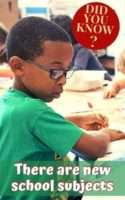Have you ever wondered about who decides what we learn at school? And how subjects changed to keep up with the times – or new government policies?
In apartheid times, the curriculum was very different. For example young people learned lots about Afrikaner history at school – and hardly anything about pre-colonial Africa. There was also a subject called Christian Religious Education at primary schools as the government prided itself on its Christian values and did not make space for other religions.
Then in 1994, with the first democratic government, the curriculum was changed completely. And since then there have been other changes to reflect the times – eg. the subjects CAT and IT have been added to reflect the growing influence of technology.
In the last 5 years the government has added new subjects particularly for grades 8 and 9. Many of these are aimed at young people who may leave school before grade 12, and need skills for employment in these tough times.
Here are some of the new subjects added:
Agricultural studies (for learners interested in farming)
Ancillary healthcare (this is healthcare at community level)
Early childhood development (this is particularly helpful for learners who may go onto work in ECD centres)
Electrical technology (this prepares learners to study for a trade after they leave school)
Wholesale and retail (this helps prepare learners for work in the retail industry)
You can find a full list here:
This year the department is trialling entrepreneurship education in 540 schools, to help learners to start their own businesses after leaving school. This is also in response to the growing unemployment rate so that young people are able to create jobs for themselves.
Another possible change for the future is the introduction of History as a compulsory subject, like Life Orientation (currently you can choose it as an option from grade 10). This has been recommended by a task team, as they found that learners had little understanding of past events, and that there is a need for all learners to understand the past in order to be able to analyse our present context critically. This is likely to be introduced in 2023.
It is interesting to think about what young people should study – and what they shouldn’t. These are important decisions that have a big impact on young people’s lives.
Tell us: what subjects do you think should be included in school? What should be left out?




 But on a serious note, I don't think adding another subject will benefit learners as we are already stressed about the 7 we do in senior-level High school, imagine more being added? No!
And L.O is a non-negotiable, L.O isn't going anywhere. It's a need
But on a serious note, I don't think adding another subject will benefit learners as we are already stressed about the 7 we do in senior-level High school, imagine more being added? No!
And L.O is a non-negotiable, L.O isn't going anywhere. It's a need